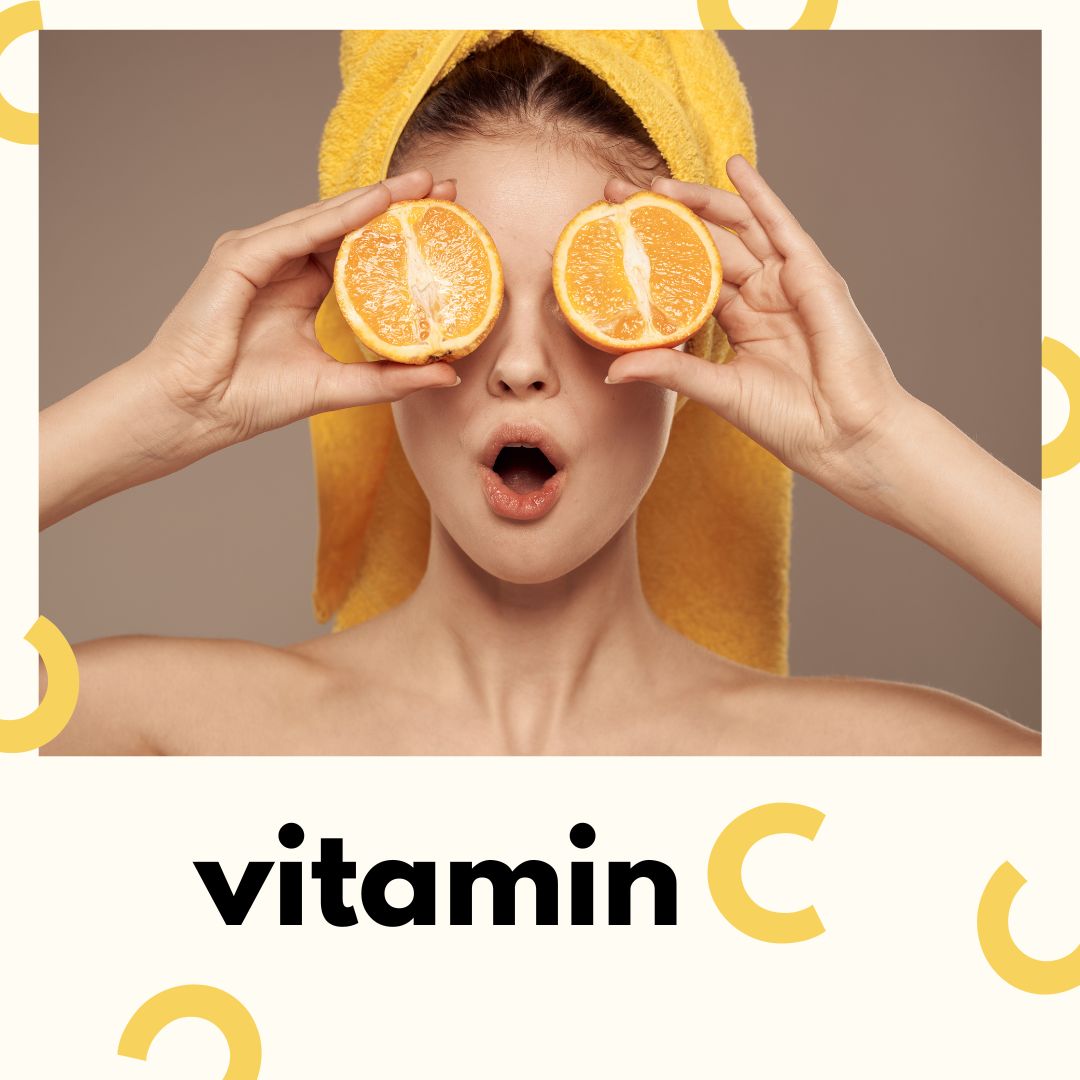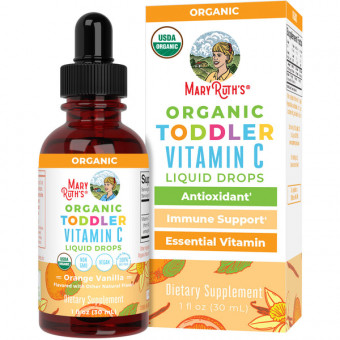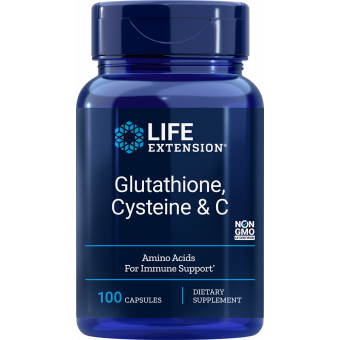Ako vitamín C pomáha zvýšiť imunitu
30.11.22
0 Komentáre

Čo je vitamín C a na čo slúži?
Vitamín C, tiež známy ako kyselina askorbová, je vo vode rozpustná živina, ktorá sa nachádza v niektorých potravinách. V tele pôsobí ako antioxidant, teda pomáha chrániť bunky pred poškodením voľnými radikálmi. Voľné radikály sú zlúčeniny, ktoré vznikajú, keď naše telo premieňa skonzumovanú potravu na energiu. Ľudia môžu byť vystavení voľným radikálom aj v prostredí, kde sa vyskytuje cigaretový dym, znečistené ovzdušie a ultrafialové žiarenie zo slnka.
Vitamín C je dobre známy svojou úlohou pri podpore zdravého imunitného systému. Pretože si vaše telo nedokáže vytvoriť vitamín C, musíte si ho doplniť z potravín, ktoré každý deň skonzumujete.
Nebolo to však takto vždy. Niekedy veľmi dávno si človek dokázal vyrobiť - syntetizovať svoj vlastný vitamín C sám. Väčšina zvierat je schopná syntetizovať kyselinu askorbovú z glukózy buď v obličkách alebo v pečeni. Asi pred 61 miliónmi rokov niektoré cicavce a primáty, vrátane našich ľudských predkov, stratili schopnosť tejto endogénnej syntézy vitamínu C. Došlo k tomu v dôsledku inaktivácie génu L-gulono-laktón oxidázy, čo spôsobilo, že bol zablokovaný posledný krok syntézy askorbátu z glukózy. Odvtedy sú tieto druhy, vrátane niektorých primátov, morčiat a kaloňov indických (druh netopiera), závislé od denného príjmu vitamínu C v strave.
Ľudské telo tiež potrebuje vitamín C na tvorbu kolagénu - proteínu potrebného na hojenie rán. Okrem toho vitamín C zlepšuje vstrebávanie železa z rastlinných potravín a tým pomáha správnemu fungovaniu imunitného systému pri ochrane tela pred chorobami. Dôležitý poznatok najmä pre vegetariánov je, že vitamín C pomáha telu lepšie absorbovať tzv. nehémové železo – druh z rastlinných potravín, ako sú fazuľa, špenát a quinoa. Ak ste vegetariánom alebo vegánom, kombinujte rastlinné potraviny bohaté na železo s potravinami bohatými na vitamín C. Skombinujte napríklad čiernu fazuľu a paradajkovú omáčku alebo si pripravte chutný špenátový šalát s jahodami a mandarínkami.
Výskum zistil, že vitamín C je nevyhnutný pre tvorbu a regeneráciu tkaniva v celom tele. Vitamín C pomáha regenerovať a udržiavať zdravé kosti, zuby, kožu a chrupavku – typ pevného tkaniva, ktoré pokrýva kosti. Ako antioxidant môže pomôcť predchádzať alebo oddialiť určité druhy rakovín, srdcových chorôb a podporovať zdravé starnutie. Vitamín C tiež môže znižovať riziko straty chrupavky u pacientov s osteoartritídou.
Aké potraviny obsahujú vitamín C?
Zdroje vitamínu C sú bohaté a ďaleko presahujú populárny pomarančový džús. Tento životne dôležitý vitamín dodávajú mnohé druhy ovocia a zeleniny. Medzi zdroje vitamínu C teda určite patria citrusové plody (ako sú pomaranče a grapefruity) a ich šťavy, melón, paradajky, zemiaky, jahody, zelená a červená paprika, brokolica, ružičkový kel a kivi. Tieto potraviny si môžete vychutnať surové alebo varené, ale je dôležité si uvedomiť, že ovocie a zelenina strácajú vitamín C, keď sa zahrievajú alebo skladujú dlhší čas. Ak chcete získať čo najviac živín, zjedzte ich čo najskôr po nákupe a zvážte krátke varenie zeleniny v pare, aby ste obmedzili stratu živín.
Aké druhy doplnkov vitamínu C sú na trhu k dispozícii?
Väčšina multivitamínov obsahuje vitamín C. Vitamín C je dostupný aj samostatne ako doplnok stravy alebo v kombinácii s inými živinami. Vitamín C v doplnkoch stravy je zvyčajne vo forme kyseliny askorbovej, ale niektoré doplnky majú aj iné formy, ako je askorbát sodný, askorbát vápenatý, iné minerálne askorbáty a kyselina askorbová s bioflavonoidmi. Pri výbere vhodného výživového doplnku by ste si mali posvietiť na pôvod vitamínu. Stáva sa, že lacný vitamín C pochádza z GMO kukurice ošetrovanej pesticídmi. Viac o tom, čím sa riadiť pri výbere výživových doplnkov nájdete v tomto článku.
Dostávam dostatok vitamínu C?
Väčšina ľudí získava dostatok vitamínu C z potravín a nápojov. Avšak u niektorých skupín ľudí je väčšia pravdepodobnosť deficiencie vitamínu C:
- Ľudia, ktorí fajčia, a tí, ktorí sú vystavení pasívnemu fajčeniu, čiastočne preto, že dym pripieva k tomu, že telo potrebuje zvýšené množstvo vitamínu C na nápravu škôd spôsobených voľnými radikálmi. Ľudia, ktorí fajčia, potrebujú o 35 mg viac vitamínu C denne ako nefajčiari.
- Dojčatá, ktoré sú kŕmené sušeným alebo prevareným kravským mliekom, pretože kravské mlieko má veľmi málo vitamínu C a teplo môže vitamín C zničiť. Kravské mlieko sa neodporúča pre dojčatá do 1 roka. Materské mlieko a dojčenská výživa majú dostatočné množstvo vitamínu C.
- Ľudia, ktorí jedia veľmi obmedzenú škálu jedál.
- Ľudia s určitými zdravotnými problémami, ako je ťažká malabsorpcia, niektoré typy rakoviny a ochorenie obličiek vyžadujúce hemodialýzu.
Čo sa stane, ak nemám dostatok vitamínu C?
Nedostatok vitamínu C je zriedkavý. Ľudia, ktorí prijímajú málo alebo žiadny vitamín C (menej ako 10 mg denne) po mnoho týždňov, môžu dostať skorbut. Skorbut spôsobuje únavu, zápaly ďasien, malé červené alebo fialové fľaky na koži, bolesti kĺbov, zlé hojenie rán. Medzi ďalšie príznaky skorbutu patrí depresia, ako aj opuchnuté, krvácajúce ďasná a uvoľnenie alebo strata zubov. U ľudí so skorbutom sa môže vyvinúť anémia. Skorbut je smrteľný, ak sa nelieči. Od latinského názvu tohto ochorenia "scorbutus" bol odvodený názov pre vitamín C - kyselina askorbová - "ascorbic", čo znamená "proti skorbutu".
Aké sú niektoré účinky vitamínu C na zdravie?
Vedci študujú vitamín C, aby pochopili, ako ovplyvňuje zdravie. Tu je niekoľko príkladov toho, čo tento výskum ukázal.
Prevencia a liečba rakoviny
Ľudia s vysokým príjmom vitamínu C z ovocia a zeleniny môžu mať nižšie riziko vzniku mnohých druhov rakoviny, ako je rakovina pľúc, prsníka a hrubého čreva.
Niekoľko štúdií na zvieratách a skúmavkách naznačuje, že vysoká hladina vitamínu C v krvi môže zmenšiť nádory. K tomu, aby sa zistilo, či vysoké dávky intravenózneho vitamínu C pomáhajú pri liečbe rakoviny u ľudí, je však potrebný ďalší výskum.
Výživové doplnky vitamínu C a iné antioxidanty môžu interagovať s chemoterapiou a rádioterapiou rakoviny. Ľudia, ktorí sa liečia na rakovinu, by sa pred užívaním vitamínu C alebo iných antioxidačných doplnkov, najmä vo vysokých dávkach, mali porozprávať so svojím onkológom.
Srdcovo-cievne ochorenia
Zdá sa, že ľudia, ktorí jedia veľa ovocia a zeleniny, majú nižšie riziko kardiovaskulárnych ochorení. Keďže oxidačné poškodenie je hlavnou príčinou kardiovaskulárnych ochorení, vedci sa domnievajú, že za to môže byť čiastočne zodpovedný obsah antioxidantov v týchto potravinách.
Vekom podmienená degenerácia makuly (makulárna degenerácia) a katarakta
Makulárna degenerácia (MD) a katarakta (šedý zákal) sú dve z hlavných príčin straty zraku u starších ľudí. Vedci neveria, že vitamín C a iné antioxidanty ovplyvňujú riziko vzniku MD. Výskum však naznačuje, že vitamín C v kombinácii s inými živinami môže pomôcť spomaliť jej progresiu.
Vo veľkej štúdii medzi staršími ľuďmi s MD, ktorí mali vysoké riziko rozvoja pokročilej MD, sa zistilo, že tí, ktorí denne užívali doplnok stravy s 500 mg vitamínu C, 80 mg zinku, 400 IU vitamínu E, 15 mg betakaroténu a 2 mg medi asi 6 rokov, mali menšiu šancu na rozvoj pokročilej MD. Mali tiež menšiu stratu zraku ako tí, ktorí neužívali doplnky výživy.
Vzťah medzi vitamínom C a tvorbou katarakty je nejasný. Niektoré štúdie ukazujú, že ľudia, ktorí prijímajú viac vitamínu C z potravín, majú nižšie riziko vzniku šedého zákalu. Je však potrebný ďalší výskum na objasnenie tejto súvislosti a na zistenie, či doplnky vitamínu C ovplyvňujú riziko vzniku šedého zákalu.
Prechladnutie
Hoci vám to nemusí zabrániť v prechladnutí, existujú určité dôkazy, že vysoké dávky vitamínu C môžu u niektorých ľudí skrátiť dĺžku príznakov nachladnutia až o jeden až jeden a pol dňa. Ľudia, ktorí pravidelne užívajú doplnky vitamínu C, môžu mať pri prechladnutí o niečo miernejšie príznaky. Iné štúdie však nepriniesli rovnaké zistenia.
Môže byť vitamín C škodlivý?
Príliš veľa vitamínu C môže spôsobiť hnačku, nevoľnosť a žalúdočné kŕče. U ľudí so stavom nazývaným hemochromatóza, ktorý spôsobuje, že telo ukladá príliš veľa železa, môžu vysoké dávky vitamínu C zhoršiť preťaženie železom a poškodiť telesné tkanivá.
Denné horné limity vitamínu C zahŕňajú príjem zo všetkých zdrojov – jedlo, nápoje a doplnky – a sú uvedené nižšie:
| Od narodenia do 12 mesiacov | Nestanovené |
| Deti 1-3 roky | 400 mg |
| Deti 4-8 rokov | 650 mg |
| Deti 9–13 rokov | 1 200 mg |
| Dospievajúci 14–18 rokov | 1 800 mg |
| Dospelí | 2 000 mg |
Všetky doplnky vitamínu C, ktoré ponúkame sú bez GMO, prírodné, bez chemických konzervantov, plnidiel a iných toxických aditív. MaryRuth´s Lipozomálny vitamín C 500 mg obsahuje vysokú dávku vitamínu C. MaryRuth´s Organický vitamín C, pochádza z organickej aceroly alebo Life Extension Glutatión, cysteín a C 500 mg. Pre deti od 1 do 4 rokov je špeciálne určený tekutý Mary Ruth's Bio organic vitamín C.
Zdroje:




Zanechajte svoj komentár